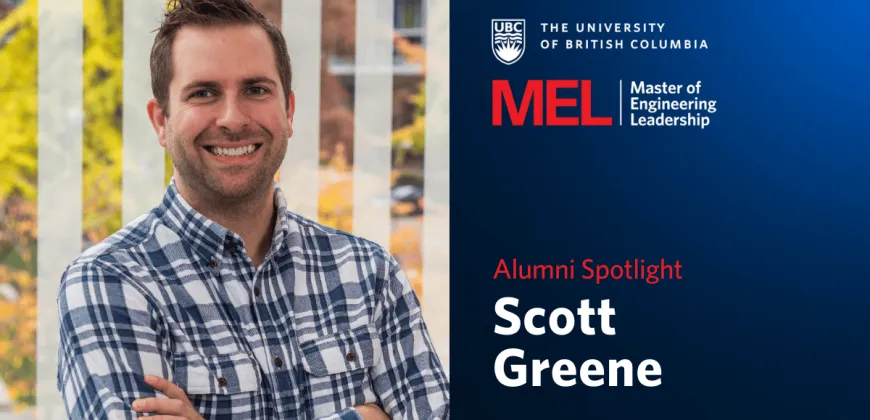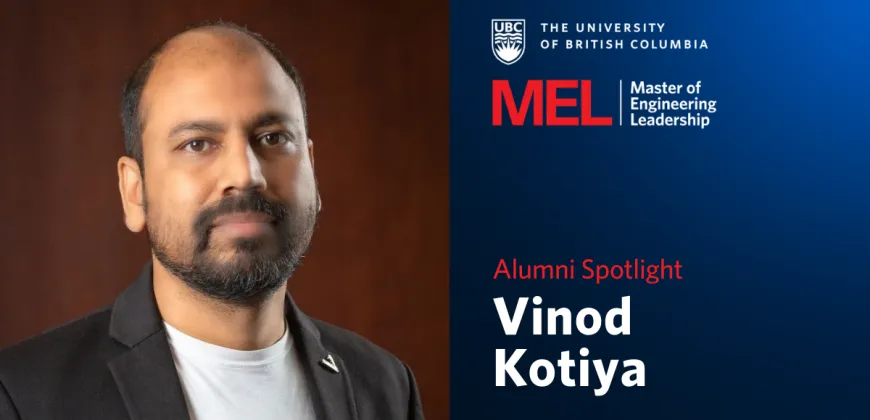Alumni Spotlight: Scott Greene
Whether at a biotech company working on biomedical instruments or at Teck Resources optimizing the haul cycle of the world’s largest trucks, Scott Greene excels by uniting his technical skills and leadership strengths.

With a degree in computer engineering from Simon Fraser University, Scott Greene landed a job as a software engineer with Stemcell Technologies, a Vancouver biotech company. Promoted to technical product manager for the software design of a major product line, he led a team designing cutting-edge biomedical instruments and participated in the full life-cycle of software development from inception to product launch.
After five years at Stemcell, however, Scott says he wanted to go back to school to strengthen his skills in business and leadership to become an even better project manager. “However, I wanted to keep my finger on the technical side, and that’s where the MEL came in,” he says. “It fit right in the middle of the MEng and MBA programs I was considering.”
The 12-month program length was also an important factor. “It’s tough these days to take more than a year off from work, especially in my case with a mortgage and a baby born just before the start of the program.”
A broad view of the industry
Scott says that the software engineering classes provided a high-level overview of significant industry trends, from cloud computing and machine learning to testing and verification. That breadth made the courses highly relevant and introduced students to topics that they might not otherwise explore.
“Cybersecurity, for instance, is something you don’t always cover in your undergrad,” he says, “and you may not have much exposure to it as part of your day-to-day work as a software engineer. But it is absolutely integral to what people are doing in software development and I ended up really enjoying it.”
Each course included hands-on and relevant experience, from writing code to collaborating on projects and making presentations. And a capstone project conducted with Critical Systems Labs looked at the testing and validation protocols of machine learning algorithms.
Foundational business skills
“The business classes were invaluable,” says Scott. “I was familiar with many concepts from my work experience, but it was helpful to put labels on ideas you intrinsically understand and to think about them more explicitly. There were also some very practical discussions, like how to run the day-to-day management of a department.”
He also says the business summer camp, a four-week class offered in the summer, was a particular highlight for “introducing different elements of business that you might not be regularly exposed to as a technical person.” The course exposes students to six core business competencies, from accounting through to business-case valuations.
Hired as a product owner
From the outset, Scott was very clear on his goal: finding a position that would draw on his skills in both business and engineering. Although he had job offers after graduating, he waited for an opportunity that wasn’t purely technical. “I knew deep down that I wanted to pivot into the business side. So I held on until a position came up that aligned with my goals.”
He began working with Teck Resources in early March as a product owner on a project to optimize the haul cycle of trucks transporting ore at the company’s mine locations. “These are the world’s largest mining trucks, hauling up to 400 tonnes of material and burning through up to 400 litres of fuel in an hour. If you can even optimize that cycle by one percent, you’ll see a significant bottom-line impact.”
Scott says the MEL’s business classes gave him a strong foundation for managing the product, communicating with the technical team and ensuring that everyone is consistently on track and sharing a common vision.
He also credits the MEL with helping him stand out in a competitive job market.
“Having that extra layer of academic backing was valuable. It was tough to turn down well-paying positions that were purely technical, but I knew what I wanted and had the confidence that the right position would come along and enable me to use my strengths in both engineering and business.”


